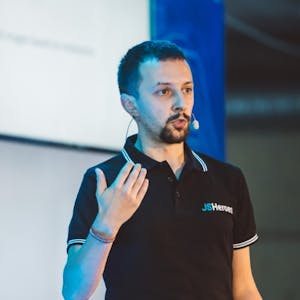Hi, everyone. Thanks for joining this talk on the next chapter of Dev Productivity, aligning experience with excellence. My name is Jeff Schnitter. I'm a Solution Architect at Cortex, and frankly, I'm not sure if I'm qualified to give the talk about Dev Productivity and aligning experience with excellence across the entire industry. I work with an amazing marketing team that studies this, and they take a look at the landscape and the competition.
So, intent of my talk isn't really to talk about all that. It's really to give you my personal experience that I've seen both as a customer of Dev Productivity, Dev Engineering Excellence, and then to show you the flip side, which is my opportunity to work with other customers working in this space.
So, I'd like to start off with a small story about the parable of the 25% bike wheel. I wish there was a parable, actually. I had a dream last night before I was going to give this talk, and I was going to ride my bike in the city. I took the bike into the city. I was in the car, and I pulled the bike out of the trunk, and I noticed that 75% of the front wheel was gone, and it had been eaten by rodents, and I figured this must be some kind of a sign for this talk.
Now, you can see in the picture that I had ChatGPT create for me that I have no idea what was going on here, and I was trying to think, is there a parable here? I would like to point out that in my dream, I kind of looked at that wheel, and the first thought I had was, would it be possible for me to ride this bike even though I've only got 25% of the wheel? And ChatGPT is really nice. After I asked it to show a 25% wheel, it puts 23% up on this target. It made me wonder, is there a story here? And I'm probably grasping at straws, but I think that to tie this into dev productivity and engineering excellence, there's a part of me that thinks we're only like 25% of the way there. Software is a journey, and this space, the ability to have the need for an internal developer portal for this kind of a product, exists because of the evolution of software, and there's a part of me that thinks that this is a sign, number one, of me grasping at straws for a metaphor, but number two, thinking that maybe there is a story here, and I think part of the story is that eng excellence is difficult, and I think that I've had days where at the end of the day, I feel like I've been riding a bike that's only got a quarter of a wheel, and it's a little bit painful on the backside, but the thing is that we got through it. So I'd love to hear your comments after you hear this talk. Do you think that we're 25% of the way through this journey from dev productivity, engineering excellence, and where would we potentially fill out the rest of the slices here? I can kind of imagine that these wedges might relate to artificial intelligence, how we're going to do automated ownership, how we're going to figure out your ecosystem based on the integrations that you're feeding in, but would love to hear your thoughts. Thanks for listening to that crazy story about the parable of the bike wheel.
So, what you're going to see in this talk is you're going to see some great slides put together by the marketing team, and then it'll be very clear the slides that I have put together, but this slide really resonates with me because it's the same journey that I've been on. I think that when I started my career in the last 15 years, I found that I was spending a lot of time on developer experience, even though we didn't call it that at the time. I was a build and release engineer. I was working on tools that developers used, and I found that I was trying to figure out the best way that we could use those tools to make developers more productive, make them happier, get the work done that they wanted to.
I think that it's been a natural evolution to move toward engineering excellence because developer experience is part of the story, but it doesn't encompass everything. I think DevEx is really about the tooling that you're using and reducing the friction for developers to make their lives easier. Engineering excellence takes a look at the full story, and I think what I have found is that there's a great amount of overlap between the two.
The story I'm going to tell is about what I found working at Workday. I was there for 16 years, and I'm going to walk you through that journey about how I kind of went from developer experience to engineering excellence, and then I'm going to extend the story since I've joined Cortex, which builds an internal developer portal, and I had the opportunity to talk to numerous customers about their journey. So, good developer experience make developers happy.
























Comments